- Home
- Jeff Jacobson
The Boy Who Couldn't Fly Straight (The Broom Closet Stories) Page 7
The Boy Who Couldn't Fly Straight (The Broom Closet Stories) Read online
Page 7
“People like us have methods for finding out where someone is. But there are ways to block that, which I did. I used those ways to get out of Seattle. I left the state, and hid out in Oregon for a while. It was while I was there that I found out I was pregnant.”
Charlie nearly dropped his fork. Pregnant? It didn’t take a rocket scientist to figure out that she meant she was pregnant with him. But who was the father? Probably not the kind-hearted Alaskan fisherman. He was embarrassed to realize that he still held some stock in his childhood fantasy.
Did she have a boyfriend in Seattle? Was it someone she met in Oregon? Why had she always been so secretive about his father?
“I was sad from leaving home, worried about how Beverly,” and here she nodded to her sister, “and my mother Margaret would do with me gone. I knew they would worry, but I just couldn’t stick around anymore.
“When I learned I was pregnant with you, I headed south, down to California. I didn’t know anyone down there, which is what I wanted. I followed maps and the advice of people I met along the way in order to find somewhere secluded. A place hidden away.”
“But why? Why didn’t you come home?” Beverly stopped, trying to find her words. “We could have helped with the pregnancy. Did you know you were going to keep the baby?”
“Yes.”
“But…how were you sure?”
“I was sure. That’s all I’m going to say on that matter.”
Charlie recognized his mother’s tone of voice, the finality of it. He wanted to tell Beverly that it didn’t matter how much she asked. His mom would hold her ground.
“Anyway, to make a long story short, I drove into Clarkston and never left. I had brought some money with me, money that I stole from Mom…”
“Liz, honey, that was your money too, there was never an issue about that,” her sister replied, sadness making the sides of her eyes draw downwards.
His mother shook her head, a look of defiance hardening her face. Charlie was used to that look; he had seen it all his life. But now, it made him wonder if she used that look to hide things, like guilt: guilt, about the money she took, about leaving her family with no word of where she was going or why, about hiding her pregnancy. These thoughts must have always been there, all that time that he was growing up. Maybe they nagged at her during the day, even while the two of them worked together in the garden, or while she baked fruit pies, or fished in the stream behind their house. Maybe they haunted her at night. It was hard to believe that she’d kept all of this to herself for so long.
She turned to him. “I took some of that money and bought the house. The rest I hid away so that you could have it one day when you grew up.
“After I had you, I got a job at the library, and settled us into our new life , doing my best not to look back. You were born and raised in Clarkston, a true child of the foothills. I wanted a quiet, easy, safe life for you. I…” she paused, looking at him, then at his aunt and uncle. “I thought I could give that to him.” She looked at him again. “To you, son.”
They sat in silence for a while, each lost in his or her own thoughts.
Finally Randall spoke. “Charlie, do you understand what kind of people your mother and Beverly are? What Demetrius and Margaret were?”
“Um, well, I guess so. Er, I mean, not really, but…”
Charlie was frustrated. Were they going to make him say what they were? Why all this talk with no one coming out and saying it?
And then, a funny thing happened (which was just one more thing to add to his list of Weird Things that Keep Happening):
All four people spoke at once. Or nearly almost. Charlie said the words in his own mind.
It was as if every single person in that dining room was tired of beating around the bush; that the fatigue was breaking through their habits of secrecy, as if finally everyone was thinking, ‘Alright, already, out with it!’
Beverly: “Charlie, we’re trying to say that we’re…”
Mom: “Son, we come from a long line of…”
Randall: “Well, your mother and aunt are both…”
Charlie (in his mind): ‘Are you telling me that you are…’
“Witches.”
“Witches.”
“Witches.”
Witches?
Chapter 11
Emilio Quintanilla, head server at the Amber Inn’s Moonlight Grill, stood near the host station surveying the state of the dining room. The brunch crowd had finally dispersed. Julito was busy breaking down the buffet table, whistling to himself like always. Jaime was vacuuming the carpet and laying out fresh linens. Emilio never fully relaxed until the final signs of the brunch buffet were gone, and he and his crew could set up the dining room for the hotel’s formal supper.
Just as he was about to double check the reservations list, he heard the elevator chime from across the lobby. An unexpected shiver ran down his back.
The first thing Emilio saw stepping out from the elevator was a suede shoe, impossibly white, beneath the cuff of what looked like expensive jeans. Following the jeans came a navy blue tailored jacket and a light-blue rock concert T-shirt. Finally a dark-haired man, looking like a Hollywood movie star, stepped through the doors and stood a mere twenty feet away, smiling at him.
Instead of acting like a normal hotel guest, the man turned halfway around and moonwalked across the lobby, moving to the hotel’s piped-in, jazzy, latin music. Emilio watched as the man stopped mid-way on the carpet and did a very impressive Running Man, ending in a double spin, then a laugh.
“Be right there, my friend,” said the man with his award-winning smile and five o’clock shadow. Emilio stood transfixed, his hand still holding the night’s reservations list. The Grill occasionally had to deal with drunken patrons or arguing business teams, but Emilio had never seen a disco-dancing hotel guest before.
The man slid over to the half-length mirror on the wall and ran his hand through his disheveled hair. Then he pulled the sleeves of his sport coat up toward his elbows, revealing muscled and darkly Mediterranean forearms.
“Damn, but those are sexy, aren’t they?” The man said as he inspected them. Emilio, who’d never thought much of a man’s forearm before, found himself nodding.
“Cha cha cha cha cha,” the man sang along with the music as he turned and walked toward the host station, one white-sueded foot in front of the other. “Cha rico, la la la la la, la LA.”
Just before reaching the entrance to the restaurant, the man dropped to the floor and did the splits, one leg in front and one leg straight behind, hands pressed into the carpet, then sprang back up to a standing position while the song reached its crescendo.
“Bring it, you know what I’m saying, hermano? Bring it on!” the man declared, wiggling his neck side to side in a faux-Egyptian head wiggle. He winked at Emilio, who had lost his professional expression and now stood with his mouth open, staring at the stranger in front of him.
For an awkward moment Emilio, whose mind ran with images of dance contests and new clothes he wanted to buy, couldn’t think of a single word to say.
Then he shook his head, yanking himself from his stupor. “How can I help you, sir?”
“Dude, you look like you should be in a jazz trio, you know that? Or a mariachi band. I’m Tony. Tony Ambrosio. Though that’s not my real name, you know what I’m saying?”
Emilio didn’t, in fact, know what the man was saying, but found himself nodding once again.
“I’d like to show you and your colleagues something over there,” the man said, pointing to the near-empty salad bar. “If I may,” he added, with a grin and a wink of such dazzle that Emilio was sure the man was going to hand him a winning lottery ticket, or the keys to a well-populated oceanside town.
He shook his head again. Where were these strange thoughts of dance contests and political ambitions coming from?
“¡Jaime¡ ¡Julito¡ Vengan aquí¡” Emilio shouted louder than he needed to, then led the man over to the sa
lad bar, where the heat from the now-extinguished chafing dishes on the nearby sideboard still warmed the air.
The other two servers walked over to Emilio and stood next to him. They were burly men, aproned, and they crossed their arms over their chests as they regarded the stranger.
The man Tony reached into his lapel pocket and pulled out two identical stones, brown-gray and smooth, then displayed them in his open palms. He looked around, as if to make sure no one else was watching.
Satisfied, he spoke. “Would you two mind grabbing these?” he asked, indicating the stones with his chin.
Jaime and Julito exchanged a look, then reached forward and took the stones from the man’s manicured hands.
“Go like this,” Tony said, making a fist and shaking it next to his left ear.
“What’s this about, amigo?” Emilio asked, his shiver returning. He did not like where the conversation was heading, though he couldn’t have been able to explain why, if pressed for details.
Tony’s Madison Avenue smile amped up in wattage, and he tilted his head to the side. His eyes sparkled, and it was entirely possible that the brown of his irises liquified, spreading wide, captivating the men.
“Oh come on, just humor me, okay?” Tony said, sounding part petulant teenager, part entitled bon vivant.
Both men holding the stones brought their hands to their ears and mimicked Tony’s shaking motion.
Twin pops like gunshots sounded in the air, and immediately the waiters’ eyes bugged out. Julito dropped the stone and grabbed at his throat, making a gurgling sound. Jaime jumped back as if shoved, crashing into the side of the metal omelet station. Both men were dead before they hit the floor.
“What the…?!” Emilio shouted, too frozen in place to do anything else.
“Yeah, I know, it rocks, doesn’t it?” Tony declared, narrowing his eyes. He raised his hand, fingers curled into a claw shape, and thrust it at Emilio, stopping mere inches from his neck. He flicked his fingers open and muttered a single word under his breath.
Emilio’s head jerked back while thin jets of blood sprayed from several open contusions along his neck. Tony shuffled to his right, saying, “Dude! Watch it! These are new shoes, okay?”
Emilio sank to his knees as he pressed his hands against his neck, unable to stop the flow of blood. In seconds he tipped backward, his upper body landing on the carpeted floor with a soft thud.
“Look at me, killing Mexican waiters!” Tony said, laughing and spreading his arms wide. “How am I even possible?”
Then he paused, looking about as if addressing an audience. “Maybe I’m supposed to say ‘Latinos’? It’s hard to be politically correct these days.”
Emilio, whose life was fading from him as swiftly as water through his fingers, lay still in a face-up position, his legs bent awkwardly beneath him, watching as the man Tony shrugged, bent over, picked up the stones from the carpet, placed them back in his jacket, then bowed to him and his dead co-workers. If he hadn’t been distracted by the horrible fact that he was about to die, Emilio would have smelled a trace of something damp, like wet kindling, in the air.
A cell phone rang. Sighing, Tony removed it from his jeans pocket and held it to his ear.
“Will you knock it off?” a woman’s voice barked on the other end, loud enough for Emilio to hear. “She wants to talk to us.”
“Alright, alright, but can you blame a guy for having a little fun?” Tony whined.
“Just get back here, okay? Pronto.”
Tony slid the phone back in his pocket, then turned and looked down at Emilio.
“Funkalicious,” he said while raising his arms and clasping his hands behind his neck. Then he made several lewd pelvic thrusts toward Emilio.
“Psychological!”
Chapter 12
Charlie was dreaming. In the dream, he was trying to make a sandwich for two small children. He had found them wandering in a place that was a cross between a large forest and an amusement park. They’d insisted that they weren’t lost, but he figured he should probably get them something to eat anyway. Weren’t kids always hungry? The problem was that as he worked at the table making the sandwiches, the kids kept running away, and the ingredients for the sandwiches kept disappearing when he’d go find the kids and bring them back. Sometimes they were two little girls. Other times they were a boy and a girl. He was pretty sure they were siblings.
Amos was there, and Charlie convinced the dog to watch the kids. It helped a bit, but now that he had the chance to make the sandwiches, he looked down and all of the bread was gone.
“Oh come on!” he said, slamming his hands down on the counter.
He opened his eyes, confused. He was sitting straight up in an unfamiliar bed, in a room he didn’t recognize. It was a strange feeling. He was pretty sure he was supposed to know where he was.
He blinked his eyes, barely able to make out the display on the bedside table clock: 3:36 AM. There was a long, gauzy curtain drifting toward him from the sill of the window, which was open and letting in cool night air.
And then he remembered. He was at Beverly and Randall’s house. His aunt and uncle. They were nice people. His mother had brought them here. She was sleeping in the room down the hall. There was a big dog named Amos. A good dog.
Images fluttered in his mind, of a growling muzzle, blood, a man punching his mother; of twine, the sound of broken bones as a body hit the ceiling. His heart leaped in his chest, and he felt sweat break out on his forehead.
Was it all true? How could it be? All that stuff that the three adults had been saying? How could any of it be true?
But he had seen it all with his own eyes. Why was he doubting it? Even before the three of them had gotten to the end of their explanation, he had known, hadn’t he?
But…no way. No way! Witches? Witches?
His mother, Ms. Worried-About-The-Bean-Vines, Ms. I-Don’t-Want-To-Talk-To-The-Townspeople, Ms….
Wide awake now, his blood pumping hard in the veins of his neck, he felt his doubts recede. Why would she have made up the story? Why would she drive them out of Clarkston, all the way to Seattle, away from the home and the land he knew she loved as much as she loved him? Why would Beverly and Randall lie along with her? And if they were all lying to him, as a part of some conspiracy pact or something, then why tell this lie? Why not make up something more believable?
But wait. Witches? Please. Witches didn’t exist. They were just characters in stupid little kids’stories.
And even if they did exist, his mother? Hocus-pocus? She canned tomatoes, for God’s sake!
He remembered his thoughts of two nights ago (Could it really have been only two nights ago? It seemed like more than a year now), about how good she was at everything. But that wasn’t witchy stuff, was it? She was a good mechanic, and a farmer and gardener, is all. People could do that stuff. Big deal. She was just better at it than most. Because they didn’t have much money, she’d had to learn how to do it all herself. Wasn’t she always talking about how rich people were lazy, that they paid people to do things they should learn how to do themselves?
Then he remembered his mother saying that she had stolen money, family money that Beverly insisted was hers to take. So, wait! Did she say all that stuff about rich people because she was one of them? Or had been, and wanted to hide from them? Or maybe even to distract people so they wouldn’t think she had any money?
Charlie rubbed his eyes with his hands. What the heck was he supposed to believe?
In his mind’s eye he saw the wave of rippled light flash from his mother’s hands and push the dog back up against the wall. He hadn’t imagined that, had he? No, he didn’t think so. And what about that orange glow from her pendant?
Then he remembered the pressure he’d felt as he’d held his own pendant in his hands. It had been like anger, hot and pressing on his forehead, but it was different, too. It had seemed to come at him from all over. Or at least through his feet and head. He’d never felt an
ything like it.
That orange light, the second time. Had it come from him? Or from the pendant? Had he somehow made it? Made that guy fly up to the ceiling?
But how could that be true? It would mean, that would mean…that he was a…
That was the stupidest thing he’d ever thought.
“You’d know if you were a witch,” he said out loud. “Really. You’d know.”
Wouldn’t you?
He leaned back against the headboard and sighed, his thoughts crowding at him like a herd of hungry sheep, pushing and pressing with their loud, insistent bleating.
He stayed that way for some time, running ideas back and forth, wanting to refute the growing evidence that the world was not as it had seemed.
The sound of a door opening and closing in the hallway grabbed his attention. He looked over at the clock again. Someone else was up at this hour? Footsteps shuffled across the rug, and then he heard what must have been the creak of the staircase as someone walked down to the first floor.
As if on cue, his stomach rumbled. It wasn’t uncommon for him to awaken in the middle of the night and go downstairs for a bowl of cereal. Could he do that here? Would it be okay?
The hunger in his stomach, and the thoughts keeping him from falling asleep, won out. He slipped into a pair of shorts, opened the door to the hallway (so different from their own home, so much nicer, with shining wood, plush carpet, tall ceilings) and walked down the stairs into the kitchen.
Beverly sat on a stool at the kitchen counter in her bathrobe, her long straight hair only slightly mussed from sleep, an empty coffee mug in front of her. The only light was the blue flame from the stove, heating water in the kettle. She looked at him as he walked in, and then smiled.
“Couldn’t sleep either, huh?”
“Uh, no. Is it, uh…”
“Of course it’s alright. It’s not every day a woman gets to meet such an outstanding young man and learn that he’s her nephew. I’d appreciate the company.”

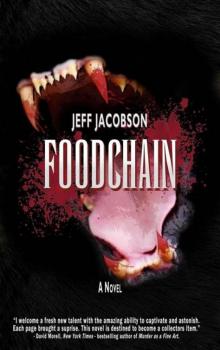 Foodchain
Foodchain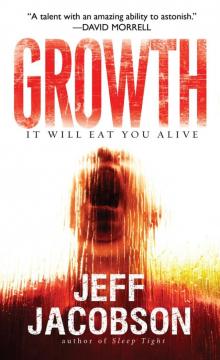 Growth
Growth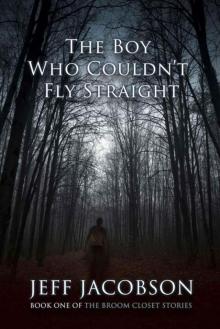 The Boy Who Couldn't Fly Straight (The Broom Closet Stories)
The Boy Who Couldn't Fly Straight (The Broom Closet Stories)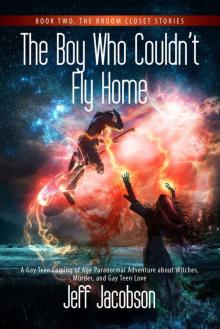 The Boy Who Couldn’t Fly Home: A Gay Teen Coming of Age Paranormal Adventure about Witches, Murder, and Gay Teen Love (The Broom Closet Stories Book 2)
The Boy Who Couldn’t Fly Home: A Gay Teen Coming of Age Paranormal Adventure about Witches, Murder, and Gay Teen Love (The Broom Closet Stories Book 2)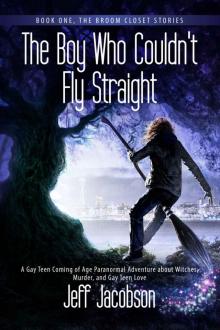 The Boy Who Couldn't Fly Straight: A Gay Teen Coming of Age Paranormal Adventure about Witches, Murder, and Gay Teen Love (Book 1, The Broom Closet Stories)
The Boy Who Couldn't Fly Straight: A Gay Teen Coming of Age Paranormal Adventure about Witches, Murder, and Gay Teen Love (Book 1, The Broom Closet Stories)